In this week’s review of Court Judgments, we look at Supreme Court’s dismissal of plea against penalty on Municipal body for dumping solid waste in a lake, Delhi High Court’s observation that Electricity is essential service, Kerala High court’s observation in a case that caused public outcry, Karnataka High Court’s judgment regarding a case relating to food adulteration and NCLAT’s observation regarding advance payment made for services not provided.
SC: Dismisses plea against penalty on Municipal body for dumping solid waste in Wular Lake
The Supreme Court dismissed an appeal by Municipal Committee, Bandipora, challenging the National Green Tribunal’s refusal to interfere with the imposition of penalty by the J&K State Pollution Control Committee (PCC).
The Municipal Committee, Bandipora was imposed a penalty of Rs. 64.21 lakhs for the dumping of solid waste in the catchment area of Wular Lake in Kashmir.
Wular Lake is the second-largest freshwater lake in Asia. In 2019, activist Dr. Raja Muzaffar Bhat filed an application in the NGT against the dumping of waste and encroachment of Hokersar Wetland, Wular Lake. The NGT had in August 2020 directed the divisional commissioner, Kashmir, state PCC and other authorities to take necessary action.
In February 2021, the state PCC said that Solid waste was continuously dumped at the Zalwan Nassu site, which is a catchment area of Wular Lake. The site was in proximity to the district headquarters in Bandipora. PCC noted that the waste was being disposed in a haphazard and unscientific manner by the Municipal committee.
State PCC levied a fine of Rs. 64.21 lakhs upon the Executive Officer Municipal Committee, Bandipora for violation of Solid Waste Management Rules, 2016. The fine was also levied in line with Environmental Compensation under Polluter Pays Principle as per approved guidelines of the Central Pollution Control Board and National Green Tribunal.
A Civil appeal was moved by the CEO of the local body. The NGT bench headed by its chairperson Justice Adarsh Kumar Goel observed that it remains undisputed that the municipal body did fail to scientifically manage the waste in terms of Solid Waste Management Rules, 2016, therefore it cannot interfere with the order passed by the state PCC. However, it stated that the amount recovered may be utilised for the restoration of the environment.
This stand of NGT was challenged in the Supreme Court. The bench of Justice Ajay Rastogi and Justice C.T Ravikumar stated that they do not find any ground to interfere with the order passed by the National Green Tribunal and proceeded to dismiss the civil appeal.
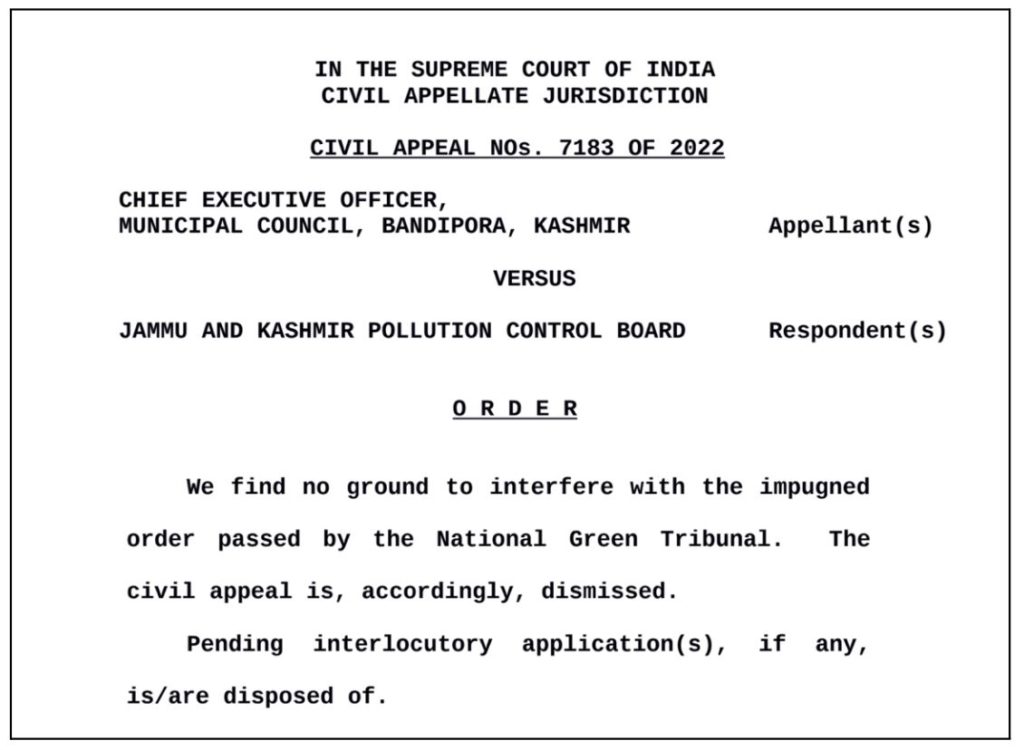
Delhi HC: Electricity is an essential service, and cannot be denied without cogent, lawful reason
In the case of Sudarshan Kumar Sharma and Anr vs. State of NCT of Delhi and Ors, the Delhi High Court bench comprising of Justice Manoj Kumar Ohri observed that electricity is an essential service and that a person cannot be deprived of it without a cogent or lawful reason.
The court was dealing with a plea filed by a couple, who are senior citizens, seeking the installation of a fresh electricity meter at their premises. They are engaged in a partition suit with the husband’s three brothers and hence want the electricity meter without the need for NOC from them.
A submission was made that, an electricity meter was provided to two of the respondents without insisting on NOC, but they have been denied the same for want of a NOC. The petitioners complied with all the formalities and there are no outstanding dues with respect to the electricity connection installed at the premises.
The counsel appearing for BSES (electricity provider) submitted that the petitioner’s request was not acceded to in view of the objections raised by the brothers. They concur with the petitioner’s submission that there are no pending dues.
The court observed that the supply of electricity cannot be denied to the petitioners. It directed the BSES to provide a fresh electricity connection without insisting on the NOC from other respondents within two weeks of filing the application.
The court said that it is well-settled that even if disputes exist regarding the ownership of a property for which an electricity connection is sought, the concerned authorities cannot deprive the legal occupant by insisting on a NOC.
With respect to NOC, reference was made to the Supreme Court ruling in the case of Dilip (dead) through Lrs vs. Satish & Others.
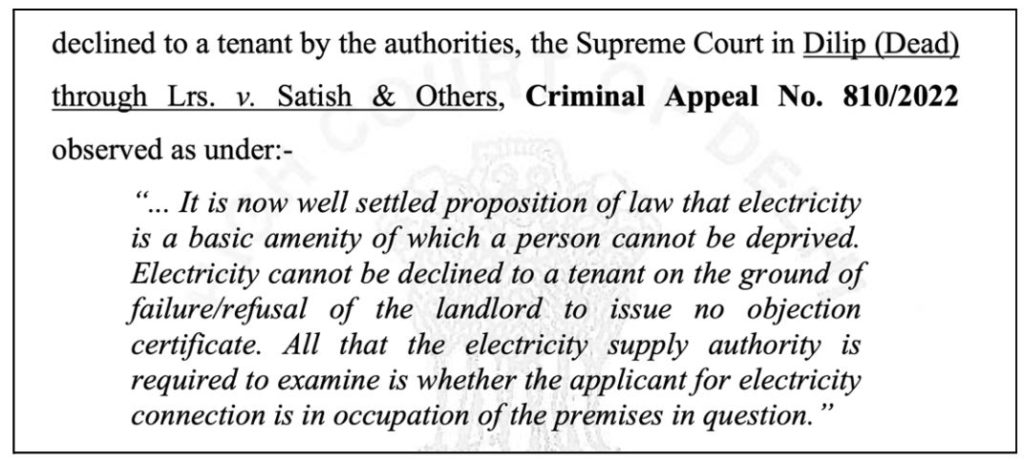
It asked the petitioners to pay the electricity charges without default and that BSES can disconnect the supply in failure of the same.
Karnataka HC: Not mentioning batch number, Best before or Veg/Non-Veg symbol on food articles is an offence.
A single judge bench of Justice Dr. H.B. Prabhakara Sastry said that food articles sold without labels mentioning their batch number, “best before” and “Veg” or “Non-veg” symbol, etc. is an offence under Section 7(i) and 7(ii) of the Prevention of Food Adulteration Act, and punishable under Section 16(1)(a).
The court was hearing the case of Syed Ahammed vs. the State of Karnataka, and upheld the decision of the trial court while dismissing the petition. The trial court has convicted one Syed Ahammed for storing and selling misbranded and adulterated coffee powder in his shop.
The complainant i.e., Food Inspector, alleged that while on his duty, he visited the petitioner’s shop and inspected the coffee seeds and their powder, which were meant for public sale. He noticed that the accused had stored and was selling misbranded and adulterated coffee powder in his shop.
He, accompanied by his staff purchased 600 gms of coffee powder and subjected it to scientific analysis. The report from the analyst confirms that the coffee powder was adulterated and misbranded. The misbranding relates to wrong information about the contents, and non-printing of batch numbers & “best before” on it. Hence it was alleged that the accused has committed the offences punishable under Sections 7(i) and 7(ii) and 16(a)(i) of the Act.
The petitioner argued that the coffee powder was not adulterated and the public analyst in the report has also not stated that consumption of that coffee powder is injurious to health. The counsel on behalf of the petitioner submitted that the shop was a small shop dealing with coffee seeds and coffee powder, therefore there was no misbranding of the coffee powder.
The court referred to the evidence, and noted that as per the scientific analysis, the caffeine content was 0.4 % which was less than the prescribed standard of “not less than 0.6%”. Further, the aqueous extract was 55%, whereas the prescribed standard was not to be more than 50%.
The analyst report also stated that the label fastened to the coffee powder shows that it was manufactured by Select Coffee Works, but the batch number, ‘best before’ and ‘veg’ or ‘non-veg’ symbol were also not printed upon it.
The court rejected the contention of the petitioner that the analyst has not opined the commodity was injurious to health and hence is not adulterated.
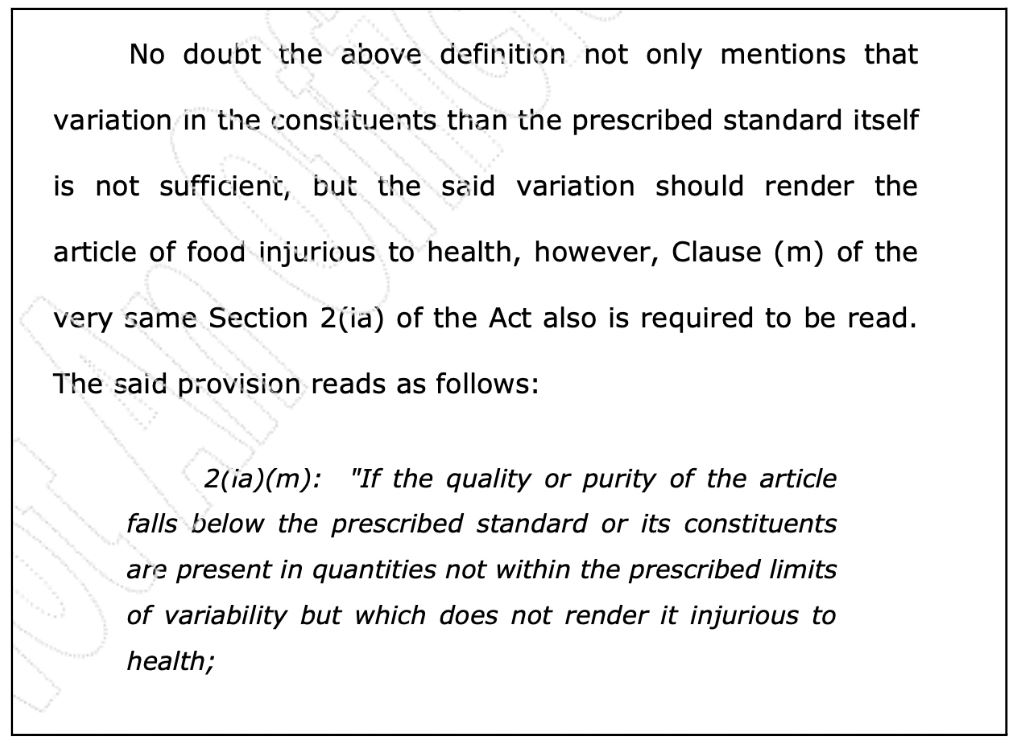
It stated that the arguments of the petitioner could not convince the court and that the coffee powder, a primary food, is proved to be adulterated.
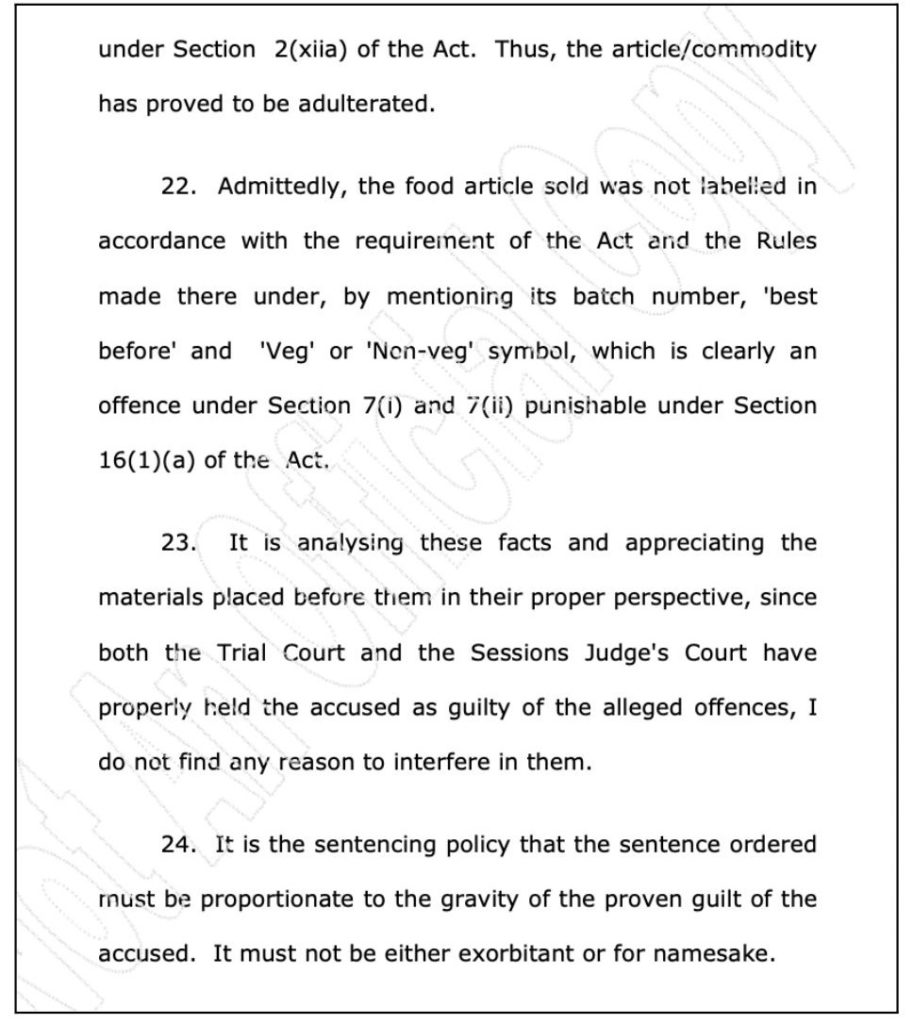
Kerala HC: Court cannot be swayed by public outcry and proceeds to grants pre-arrest bail in an assault case.
Kerala High Court has granted pre-arrest bail to three Kerala State Road Transport Corporation (KSRTC) employees, who were booked for assaulting a man and his daughter for demanding renewal of a concession certificate for her. There was a public outcry after a video of the incident was leaked in the media.
As for the case details, the accused were booked for offences punishable under Sections 294(b), 341, 342, 323, 324 and 354, read with Section 34 IPC. As per the submission of the persecution, the petitioners along with other accused (also KSRTC employees) formed an unlawful assembly and verbally abused and assaulted the complainant and his daughter. As per the statement given by the daughter, the complaint alleging the accused of outraging her modesty was also added.
The counsels on behalf of the petitioners contended that they were innocent and added that the public outrage was due to a distorted video and wrong media publicity.
The prosecution opposing the bail application submitted that the allegations were serious in nature. It also pointed out that since the video was leaked to the public, it would send a wrong message to the public if the accused were granted bail.
Based on the details, the court said that the only non-bailable offence is in relation to Section 354 IPC. It stated that the circumstances and the intention of the accused have a bearing on defining outrage to a woman’s modesty. In her statement, the complainant’s daughter submitted that in the push and pull during the incident, she felt pain over her body but asserted that none had hit her.
Based on the facts and circumstances and the statement given by the complainant and his daughter, the Court observed that custodial interrogation of the petitioners is not essential.
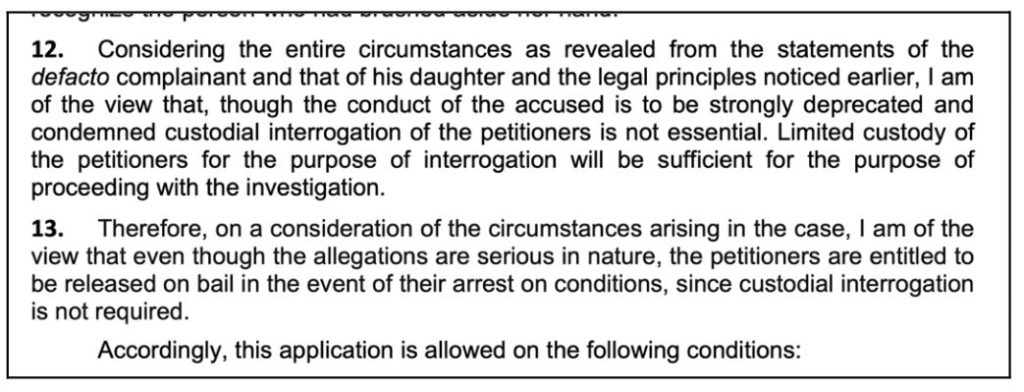
The court stated that it cannot be swayed by public outcry and needs to strictly confine itself to the allegations and the statements given by the witnesses.
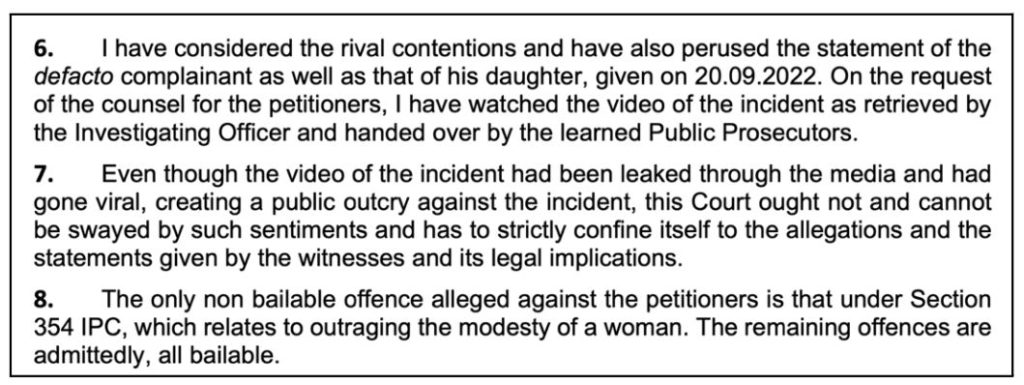
NCLAT Delhi: Advance paid towards service is operational debt.
As per the details of the case, Chipsan Aviation Private Limited vs. Punj Llyod Aviation Limited, Chipsan Aviation Pvt ltd. was engaged in business with Punj Lloyd Aviation ltd. for charter services of aeroplanes and helicopters, hired on a long-term basis for non-scheduled operators/owners.
On 28 March 2016, Chipsan Aviation Pvt Ltd (Operational Creditor) advanced an amount of Rs. 60 lakhs to Punj Lloyd (Operational Debtor) for aviation-related services. However, the services were not provided, nor was the advance amount refunded.
The amount received was shown under Current liabilities in the Balance Sheet of the Corporate Debtor. It was continuously shown as advances received from the customers during the financial years 2015-16, 2016-17 and 2017-18.
In late 2019, the Operational Creditor issued a Demand Notice under the Insolvency and Bankruptcy Code (IBC), to the Operational Debtor demanding a refund of the advance amount.
Since there was no response, the Operational Creditor filed a petition under IBC, seeking initiation of an Insolvency Resolution Process against the Corporate Debtor over a default of Rs. 97.4 lakhs, inclusive of interest.
The Operational Debtor responded stating that there was no privity of contract between the parties and that no operational debt exists under IBC. It stated that the contract was with M/S Buildarch Aviation. It also pointed out that the advance payment was made on 28 March 2016 and the petition was filed after the expiry of three years.
The Adjudicating Authority rejected the petition and held that the advance payment made by the operational creditor does not fall within the definition of Operational Debt. The Operational Creditor filed an appeal before NCLAT against the order.
NCLAT’s bench placed emphasis on the Supreme Court judgment in Construction Consortium Limited vs. Hitro Energy Solutions Pvt. Ltd.
It observed that though there was no privity of contract between the parties, the advance payment of Rs. 60 lakhs is clearly operational debt. It stated that the Adjudicating Authority had committed an error in rejecting the petition. It set aside the order and revived the petition by Chipsan Aviation Pvt Ltd.
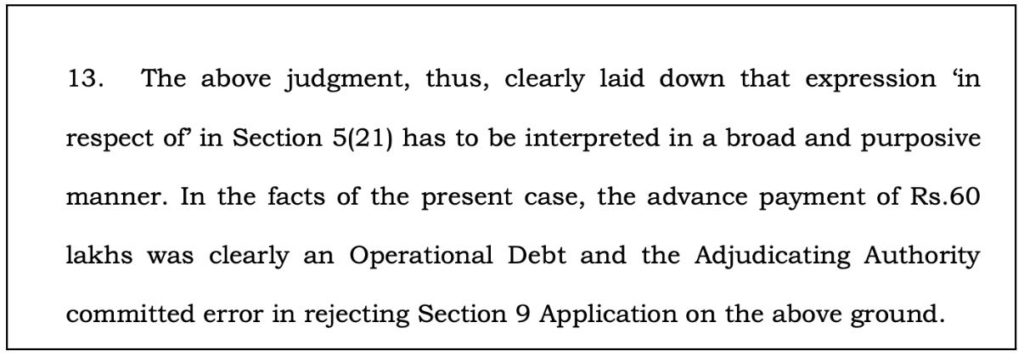
Featured Image: Review of Court Judgments


